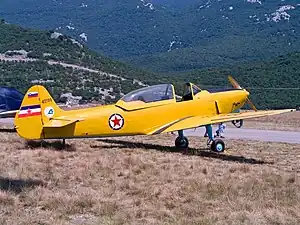UTVA Aero 3
The UTVA Aero 3 was a piston-engined military trainer aircraft built in Yugoslavia to replace the Ikarus Aero 2 then in service. One hundred ten were built, in Yugoslav Air Force service from 1958 to mid-1970s.[1] It was superseded by the UTVA 75.
.jpg.webp)
| Aero 3 | |
|---|---|
 | |
| Aero 3 - Letalski center Maribor | |
| Role | Military trainer |
| National origin | Yugoslavia |
| Manufacturer | UTVA |
| First flight | August 1956 |
| Introduction | 1958 |
| Primary user | Yugoslavia |
| Number built | 110 |
Design and development
First flown in 1956[2] the Aero 3 was designed to meet a Yugoslav Air Force requirement for a primary trainer that could also be used in the army co-operation role.[2]
The Aero 3 was a low wing cantilever monoplane that seated the student and instructor in tandem under a bubble canopy.[2] Of all wood construction it had a fixed, tailwheel landing gear and powered by a nose-mounted 190 hp (142 kW) Lycoming O-435-A piston engine.[2]
Former military operators
.svg.png.webp) Yugoslavia
Yugoslavia
- Yugoslav Air Force
- Aviation Technical Group of Aviation Training School (1958–1960)
- Light Combat Aviation Squadron of 3rd Air Command (1959-1961)
- Light Combat Aviation Squadron of 5th Air Command (1959-1961)
- Light Combat Aviation Squadron of 7th Air Command (1959-1961)
- 463rd Light Combat Aviation Squadron (1961-1965)
- 464th Light Combat Aviation Squadron (1961-1965)
- 465th Light Combat Aviation Squadron (1961-1965)
- Letalski center Maribor (Civil operator 1961-2011)
- Yugoslav Air Force
Aircraft on display
- Serbia
Specifications
Data from [2]
General characteristics
- Crew: 2 a teacher and student
- Capacity: 2
- Length: 8.58 m (28 ft 1 in)
- Wingspan: 10.5 m (34 ft 5 in)
- Height: 2.7 m (8 ft 10 in)
- Wing area: 18.9 m2 (203 sq ft)
- Gross weight: 1,198 kg (2,646 lb)
- Powerplant: 1 × Lycoming O-435-A piston engine , 142 kW (190 hp)
Performance
- Maximum speed: 230 km/h (143 mph, 124 kn)
- Cruise speed: 180 km/h (112 mph, 97 kn)
- Range: 680 km (422 mi, 367 nmi)
- Service ceiling: 4,300 m (14,100 ft)
See also
Aircraft of comparable role, configuration, and era
References
Notes
- Ugolok Neba
- Orbis 1985, page 36
Bibliography
- The Illustrated Encyclopedia of Aircraft (Part Work 1982–1985). Orbis Publishing.